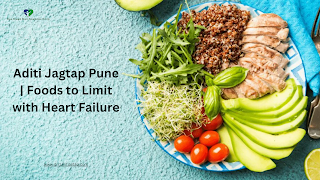Aditi Jagtap Pune | Foods to Limit with Heart Failure
Living with heart failure can be challenging, but managing your diet plays a crucial role in maintaining your health and well-being. While certain foods are beneficial for heart health, others can exacerbate symptoms and worsen the condition. Understanding which foods to limit can empower you to make informed choices and support your heart health journey.
The Culprits: Understanding Why Certain Foods Can Be Detrimental
As per Dr. Ranjit Jagtap Daughter, Several key components in specific foods can negatively impact individuals with heart failure. Here are some of the main culprits:
- Excess Sodium (Salt): Sodium plays a significant role in regulating fluid balance in the body. However, consuming too much sodium can lead to fluid retention, which puts additional strain on the heart that’s already struggling to pump efficiently in heart failure. This can worsen symptoms like shortness of breath, fatigue, and swelling.
- Saturated and Trans Fats: These types of fats increase your “bad” LDL cholesterol levels while decreasing your “good” HDL cholesterol. High LDL cholesterol contributes to plaque buildup in arteries, making them narrower and hindering blood flow to the heart, ultimately exacerbating heart failure symptoms.
- Added Sugars: Excessive sugar intake can contribute to weight gain and obesity, increasing the workload on the heart. Additionally, high blood sugar levels can further complicate heart failure management.
- Processed Foods: Often loaded with sodium, unhealthy fats, and added sugars, processed foods offer little to no nutritional value and can significantly impact your heart health.
Foods to Limit or Avoid:
Here’s a breakdown of specific food categories to limit or avoid when managing heart failure:
- Salty Foods: This includes processed meats like bacon, ham, hot dogs, sausages, and deli meats. Canned vegetables, soups, certain cheeses, salty snacks like chips and pretzels, and restaurant meals (often high in hidden sodium) should also be limited. Opt for fresh or frozen vegetables with no added salt, choose lean meats like skinless chicken or fish, and season your food with herbs and spices instead of salt, says Dr. Ranjit Jagtap Daughter.
- Fatty Meats: Fatty cuts of red meat like marbled steaks, ground beef with high fat content, and processed meats like sausages are high in saturated fat. Opt for lean cuts of meat like chicken breasts, fish, and plant-based protein sources like beans and lentils.
- Sugary Drinks and Sweetened Beverages: Limit or avoid sugary sodas, juices, energy drinks, sweetened coffee drinks, and other beverages loaded with added sugars. Opt for water, unsweetened tea or coffee, and low-fat milk instead.
- Highly Processed Grains: White bread, white rice, pasta, and sugary cereals are not only devoid of fiber but also tend to elevate blood sugar levels and contribute to weight gain. Choose whole grains like brown rice, quinoa, whole-wheat bread, and whole-grain cereals instead.
- Baked Goods and Pastries: Cakes, cookies, pastries, and donuts are often high in unhealthy fats, added sugars, and refined carbohydrates, making them detrimental to heart health. Opt for healthier alternatives like fruits with natural sugars, homemade baked goods made with whole grains and minimal added sugars, or low-fat yogurt with fruit according to Aditi Jagtap Pune.
Remember:
- Portion Control is Key: Even seemingly healthy foods can be detrimental if consumed in excess. Practice mindful eating and pay attention to portion sizes.
- Read Food Labels: Become a label-reading pro! Look for low-sodium options, check for saturated and trans fat content, and be mindful of added sugar content.
- Seek Guidance: Consult a registered dietitian or healthcare professional for personalized guidance on creating a heart-healthy meal plan tailored to your specific needs and preferences.
Living with heart failure doesn’t mean sacrificing flavor or enjoyment in your diet. By limiting specific foods and embracing heart-healthy alternatives, you can empower yourself to manage your condition effectively and maintain a fulfilling, healthy lifestyle.
Additional Tips:
- Focus on incorporating fruits, vegetables, and whole grains into your diet. These foods offer essential vitamins, minerals, and fiber to support overall health.
- Healthy fats are your friends! Choose sources like avocados, nuts, seeds, and olive oil for their heart-protective benefits.
- Cooking at home allows you greater control over ingredients and portion sizes. Experiment with spices and herbs to create delicious and heart-healthy meals.
Remember, consistency is key. By making small, sustainable changes to your diet, you can significantly improve your heart health and overall well-being while managing heart failure.




Comments
Post a Comment